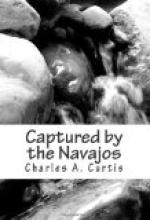At five we arrived opposite the third spur, where we found a wand sticking in the ground and holding in its cleft end a slip of paper. It proved to be a note from Mr. Hudson, saying that this was the place to camp, and the Black Tanks were on the southern side of the spur, three miles distant.
In a few minutes, with the horses and mules divested of saddles, bridles, and harnesses, leaving two men behind to guard the property and collect fuel for a fire, we were on the way to water.
Hurrying along, we saw before us a long, irregular range, apparently three thousand feet in height, which had been cleft from summit to base as if by a wedge. In this rent we found water—water deposited in a natural reservoir by the periodical rainfalls in millions of gallons, a reservoir never known to be dry.
Climbing over the dike which enclosed the main deposit, we descended to the cistern, filled our cups, and swallowed the contents without taking a breath. When we dipped up a second, Tom Clary looked into the depths of his cup with knitted brows.
“Whist, now, sergeant laddies!” he exclaimed. “Look into the wather! It’s aloive with wigglers of ivery variety. They’re ’s plinty as pays in a soup.”
“Ugh! And we are full of them, too, Tom,” said Henry, looking into his cup with narrow-eyed anxiety.
Pausing in the act of taking a second drink, I looked into my cup, and saw that it contained myriads of animalcula and larvae, which zigzagged from side to side in the liveliest manner.
“Will they hurt us, Tom?” questioned Henry.
“I rickon they’ve got the worst of it, sergeant laddie; but I think I’d fale a bit aisier if I was blindfolded or takin’ a drink in the dark. I prefer me liquid refrishment with a little less mate, not to minshin its bein’ less frisky.”
We had come to the Cisternas Negras with towels, intending to wash off the dust of travel. We now used one of them to strain the water, and were astonished to see that each gallon left behind it a plump spoonful of animalcula. The water was sweet, but, after discovering the abundant life in it, we deferred drinking more of it until it had been boiled.
As we pursued the narrow path to camp in single file, we noticed Vic a considerable distance to the right, scouting and nosing about in an earnest manner. Evidently she thought she had made an important discovery, for she several times paused and looked in our direction and barked. But we were too hungry to investigate, and soon she disappeared from our view.
When we reached the ambulance the boys put a few cakes of hard bread in their pockets, and, taking their shot-guns, went out to look for some “cottontails” while supper was being prepared. Believing we were well out of the range of hostile Indians, I did not object to their going alone. They passed a considerable distance beyond the growth of Cereus giganteus, over a level stretch covered with knee-high bunch-grass and desert weeds, without seeing a hare. Pausing on the brink of a shoal, dry ravine, they stood side by side, and rested the butts of their guns upon the ground. Just then a shout of “Supper! supper!” came from the group at the camp-fire.




